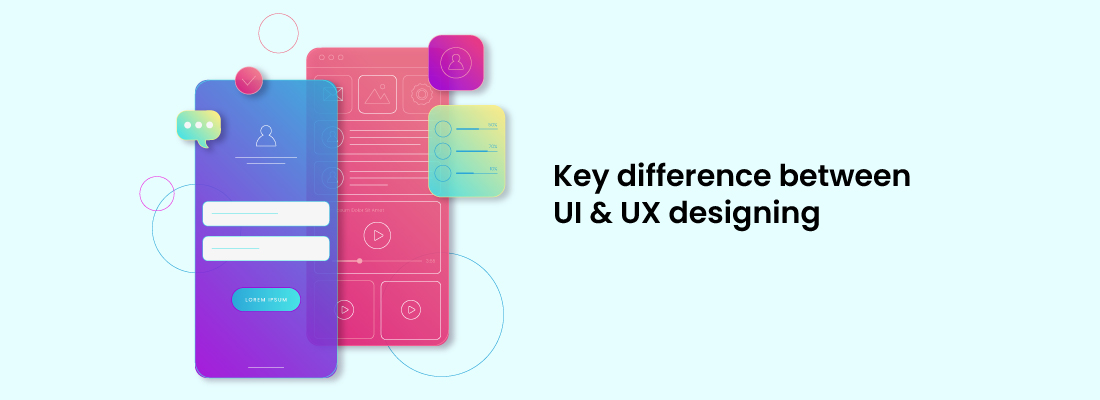The key difference between UI and UX designing

UI and UX are two important concepts in the design of digital products. While the two terms are often used interchangeably, they have distinct meanings and functions.
A person can engage with a product or service by using a variety of screens, pages, and visual components, such as buttons and icons, through the user interface (UI).
On the other side, user experience (UX) refers to the internal impressions a person has while interacting with all facets of a company's goods and services.
It is typical for people to improperly or interchangeably use these terms.
If you've ever pondered the questions "What is UI, what is UX, and difference between UI and UX designing?" Today, we'll delve a little deeper into UI and UX to better grasp how they differ from one another.
 Read More: THE SIGNIFICANCE OF UI UX DESIGN IN THE APPLICATION DEVELOPMENT PROCESS
Read More: THE SIGNIFICANCE OF UI UX DESIGN IN THE APPLICATION DEVELOPMENT PROCESS
What is UX design?
A user experience (UX) designer is concerned with aligning the expectations of the user and the product. UX designers participate in the definition, scoping, and discovery of the needs of the clients by providing early-stage concepts utilizing wireframes or low-fidelity prototypes. The designer can then evaluate and make changes to the designs. The primary goal of the UX designer will be to give clients a smooth and effective workflow. By working with current or potential clients, and internal stakeholders, and/or basing their initial design on publicly available market reports, they will do their own research. A UX designer will construct a wireframe if they have an understanding of the customer's pain points and the processes they must take in order to use the product. This rough draft describes the layout and features of the website or app and is frequently produced using design software like Sketch. The ongoing interaction between the UX designer and the rest of the team will assist in testing their initial workflow and making adjustments in response to user feedback or technical constraints as the product takes shape.What is UI design?
A User Interface (UI) designer focuses on the interaction and visual aspects of a product — what the website or app will look like and how it behaves. Prior to user-driven design becoming a major priority in the design world, designers concentrated on general functionality and branding. Is the page functional? Good. Are our company's colors noticeable? Fabulous. However, users now want smooth functionality from websites and applications in addition to being distinctive and attractive. The goal of the UI designer is to make those wireframes come to life and create prototypes that incorporate all of the brand and accessibility requirements as well as the UX designers' suggestions. UI designers pay close attention to every little thing, including typography and brand usage, and make sure that every project they work on seems familiar and coordinates with other touchpoints. For instance, you want the appearance of your app, website, and landing pages to be consistent. UI designers have the ability to innovate the design at the same time. They can develop more inventive ways to present information, interact with the product, and enhance the user experience because they get to concentrate more on the creative aspect of the project. Of course, it's best to consult with the rest of the design and product teams to ensure that the interface design supports user objectives and is effective throughout the user experience.
